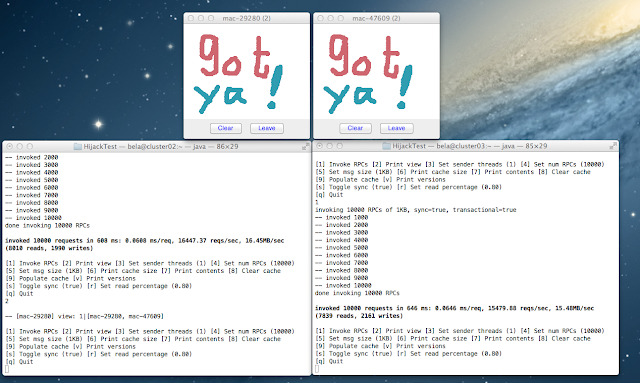The major features, bug fixes and optimizations are:
- View creation and coordinator selection is now pluggable
- Cross site replication can have more than 1 site master
- Fork channels: light weight channels
- Reduction of memory and wire size for views, merge views, digests and various headers
- Various optimizations for large clusters: the largest JGroups cluster is now at 1'538 nodes !
- The license is now Apache License 2.0
Enjoy !
[1] https://sourceforge.net/projects/javagroups/files/JGroups/3.4.0.Final
[2] https://issues.jboss.org/browse/JGRP/fixforversion/12320869
Changes:
****************************************************************************************************
Note that the license was changed from LGPL 2.1 to AL 2.0: https://issues.jboss.org/browse/JGRP-1643
****************************************************************************************************
New features
============
Pluggable policy for picking coordinator
----------------------------------------
[https://issues.jboss.org/browse/JGRP-592]
View and merge-view creation is now pluggable; this means that an application can determine which member is
the coordinator.
Documentation: http://www.jgroups.org/manual/html/user-advanced.html#MembershipChangePolicy.
RELAY2: allow for more than one site master
-------------------------------------------
[https://issues.jboss.org/browse/JGRP-1649]
If we have a lot of traffic between sites, having more than 1 site master increases performance and reduces stress
on the single site master
Fork channels: private light-weight channels
--------------------------------------------
[https://issues.jboss.org/browse/JGRP-1613]
This allows multiple light-weight channels to be created over the same (base) channel. The fork channels are
private to the app which creates them and the app can also add protocols over the default stack. These protocols are
also private to the app.
Doc: http://www.jgroups.org/manual/html/user-advanced.html#ForkChannel
Blog: http://belaban.blogspot.ch/2013/08/how-to-hijack-jgroups-channel-inside.html
Kerberos based authentication
-----------------------------
[https://issues.jboss.org/browse/JGRP-1657]
New AUTH plugin contributed by Martin Swales. Experimental, needs more work
Probe now works with TCP too
----------------------------
[https://issues.jboss.org/browse/JGRP-1568]
If multicasting is not enabled, probe.sh can be started as follows:
probe.sh -addr 192.168.1.5 -port 12345
, where 192.168.1.5:12345 is the physical address:port of a node.
Probe will ask that node for the addresses of all other members and then send the request to all members.
Optimizations
=============
UNICAST3: ack messages sooner
-----------------------------
[https://issues.jboss.org/browse/JGRP-1664]
A message would get acked after delivery, not reception. This was changed, so that long running app code would not
delay acking the message, which could lead to unneeded retransmission by the sender.
Compress Digest and MutableDigest
---------------------------------
[https://issues.jboss.org/browse/JGRP-1317]
[https://issues.jboss.org/browse/JGRP-1354]
[https://issues.jboss.org/browse/JGRP-1391]
[https://issues.jboss.org/browse/JGRP-1690]
- In some cases, when a digest and a view are the same, the members
field of the digest points to the members field of the view,
resulting in reduced memory use.
- When a view and digest are the same, we marshal the members only
once (in JOIN-RSP, MERGE-RSP and INSTALL-MERGE-VIEW).
- We don't send the digest with a VIEW to *existing members*; the full
view and digest is only sent to the joiner. This means that new
views are smaller, which is useful in large clusters.
- JIRA: https://issues.jboss.org/browse/JGRP-1317
- View and MergeView now use arrays rather than lists to store
membership and subgroups
- Make sure digest matches view when returning JOIN-RSP or installing
MergeView (https://issues.jboss.org/browse/JGRP-1690)
- More efficient marshalling of GMS$GmsHeader: when view and digest
are present, we only marshal the members once
Large clusters:
---------------
- https://issues.jboss.org/browse/JGRP-1700: STABLE uses a bitset rather than a list for STABLE msgs, reducing
memory consumption
- https://issues.jboss.org/browse/JGRP-1704: don't print the full list of members
- https://issues.jboss.org/browse/JGRP-1705: suppression of fake merge-views
- https://issues.jboss.org/browse/JGRP-1710: move contents of GMS headers into message body (otherwise packet at
transport gets too big)
- https://issues.jboss.org/browse/JGRP-1713: ditto for VIRE-RSP in MERGE3
- https://issues.jboss.org/browse/JGRP-1714: move large data in headers to message body
Bug fixes
=========
FRAG/FRAG2: incorrect ordering with message batches
[https://issues.jboss.org/browse/JGRP-1648]
Reassembled messages would get reinserted into the batch at the end instead of at their original position
RSVP: incorrect ordering with message batches
---------------------------------------------
[https://issues.jboss.org/browse/JGRP-1641]
RSVP-tagged messages in a batch would get delivered immediately, instead of waiting for their turn
Memory leak in STABLE
---------------------
[https://issues.jboss.org/browse/JGRP-1638]
Occurred when send_stable_msg_to_coord_only was enabled.
NAKACK2/UNICAST3: problems with flow control
--------------------------------------------
[https://issues.jboss.org/browse/JGRP-1665]
If an incoming message sent out other messages before returning, it could block forever as new credits would not be
processed. Caused by a regression (removal of ignore_sync_thread) in FlowControl.
AUTH: nodes without AUTH protocol can join cluster
--------------------------------------------------
[https://issues.jboss.org/browse/JGRP-1661]
If a member didn't ship an AuthHeader, the message would get passed up instead of rejected.
LockService issues
------------------
[https://issues.jboss.org/browse/JGRP-1634]
[https://issues.jboss.org/browse/JGRP-1639]
[https://issues.jboss.org/browse/JGRP-1660]
Bug fix for concurrent tryLock() blocks and various optimizations.
Logical name cache is cleared, affecting other channels
-------------------------------------------------------
[https://issues.jboss.org/browse/JGRP-1654]
If we have multiple channels in the same JVM, the a new view in one channel triggers removal of the entries
of all other caches
Manual
======
The manual is at http://www.jgroups.org/manual-3.x/html/index.html.

